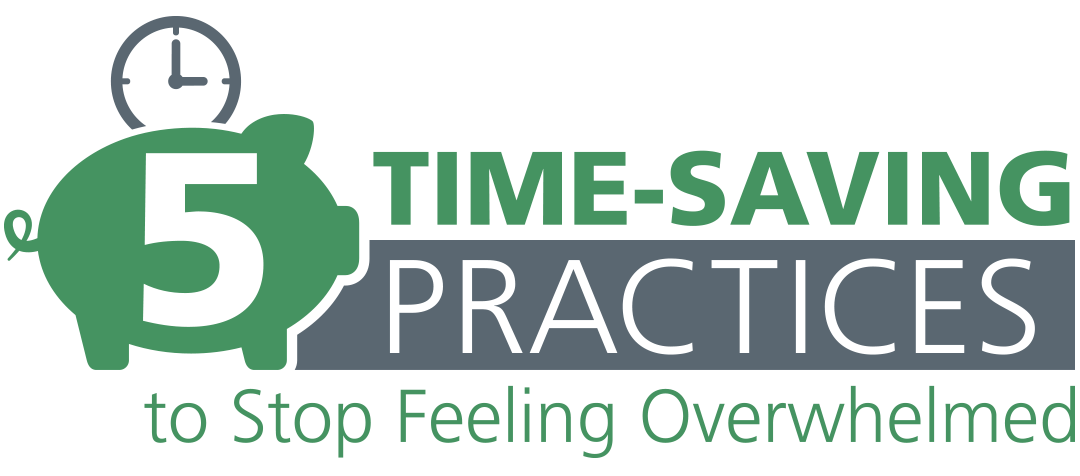
As a teacher, you have so many responsibilities that stress and overwhelm are almost inevitable. But what if they weren't? Special guest Angela Watson, creator of the 40 Hour Teacher Workweek, joins us to discuss four simple but powerful time-management strategies that will reduce stress right away and help you achieve better work/life balance.
listen here:
The 4 Time-Management Strategies
Periodically we as educators should review how well our systems and life rhythms are serving us. The close out of a school year is a natural place to reflect, but this can (and should) happen multiple times a year. What do we want our school day to look like? How do we want to feel at the end of a day of teaching? How do we want to feel driving in to work? What habits and systems are working? How do we make future days and years better than the ones before? We have the opportunity over and over again to create a new work/life culture of balance. Here are 4 time-management strategies to get this started.
1. Establish boundaries
Teaching is a lot like parenting in that it can feel like a job that never ends. You rarely if ever go to bed feeling that you did all you could do or met every child’s needs. It may feel like there is always more you could (and/or should) be doing. If you’re not clear on what's important, you’ll always feel guilty and like you’re not doing enough.
Boundaries in time-management help you decide with intentionality in advance what you’re going to say “yes” to and what you’ll say “no” to. Saying “no” allows you to free up time for what you want to say "yes" to.
For example, you might decide you aren’t going to work past a certain time on evenings and weekends. Even if your administrator says you need to respond to parents on evenings and weekends, you can tell parents what your availability is and when they can expect a response. Don’t train people to have 24/7 access to you. Instead of only thinking about what will work right now, you need to think about what will be sustainable over the long term. Boundary setting is about counting the cost in advance and deciding what kind of life you want to live.
2. plan for margin or buffer
A lot of the stress we feel comes from rushing. We have too many things we are trying to do in too short of a time period. So when a child wants to talk about something off-topic or is dawdling, because we are so rushed, it’s no longer a minor inconvenience. It becomes a threat to the schedule that we feel obligated to. The time-management plan then becomes more important than the child and that doesn’t feel right.
When you build margin into your day, you’re allowing extra space for interruptions like this to happen so you’re able to be present and responsive to the people in front of you. So practically, this looks like reviewing 10 practice problems instead of 20 so that you can go slow and deep in your review. It may mean giving kids extra time to complete a project so that you can provide extra support and make sure they’re all successful. It could also look like leaving out one activity from your lesson plan so that you can take your time instead of rushing to fit everything in.
You can also build margin into your personal life and time-management. This may mean setting the alarm 10 minutes earlier than you need it to go off or scheduling an appointment 20 minutes later than you think you need to in case there’s unexpected traffic. It could look like setting a reminder alarm about an event ten minutes beforehand instead of five minutes beforehand to have more time to get ready for it.
3. doing fewer things better
Many of us judge our worth and our value by how much we get done. Self-care, rest, and sleep are seen as being lazy. The reality is that our modern lives are incredibly demanding and we have more information to process than any other humans throughout history. It’s such a complex time to be alive. Our bodies can’t do all that we think we should be doing. All of this takes a toll.
We need to focus on what we should do, not what we could do. What are the things that we want to actually spend our time on? What things lead to a meaningful, fulfilling life? Most people are perpetually in motion and don’t have time to think about their lives in this way. You need rest to daydream and imagine and tap into a sense of purpose. You can’t hear that still small voice if you’re always talking and always doing. Think to yourself, “What is the best use of my time?” Then pour yourself 100% into those things. When you try to do everything, you end up not doing anything well.
4. Don't do your best on everything
This may sound a little crazy. We are taught from childhood that if something is worth doing, it’s worth doing right. However, we live in a different world now where we have more to process than ever. We can’t give 100% attention to everything that comes our way. Some things will have to be released and some of it really doesn’t matter.
Your laundry doesn’t need to be perfectly folded. What matters is having clean clothes and being able to access them easily. Use the extra time you save on something you care about more. If dinnertime is always hectic, maybe think about a different approach to meal prep or simplify dinners so that dinner doesn’t take quite so long. It comes back to figuring out what’s important and then putting your energy toward those things.
Here’s a personal story about this from Linda- When I was back in college, we had to prepare overheads for an overhead projector and we also had to put them into a frame. Not only that, we had to take pieces of masking tape and cut them and position them so that there was a perfect 90 degree angle on the back of every corner of the frame. The professor said, “Your students will never see it, but you’ll know you did your best work.” No! Some things require our best, some require mediocre effort, and some require the bare minimum. The back of the projector should have been a bare minimum task.
If we did everything perfectly, we wouldn’t have time for the things we actually want to do. People who are Type A struggle with this because their best may take 2 hours longer than someone else’s best. Their 100% would probably be someone else’s 150% so if they give 80%, it’s likely no one else will ever notice. This isn’t slacking off, this is intentionally choosing where to spend that best effort.
Join us for this - FREE - training

now available on-demand
for a limited time
resources mentioned:
Angela Watson's 40 Hour Teacher Workweek Club
Free webinar: 5 Time-Saving Practices to Stop Feeling Overwhelmed
spread the word!
Did you find this post helpful? Clue in your fellow teachers by sharing the post directly (just copy the URL) or by clicking one of the buttons to automatically share on social media.
Pin it for later ⤵

This article may contain affiliate links. This means that if you purchase a resource after clicking the link, Teach 4 the Heart may receive a small commission at no extra cost to you. Thanks for helping support Teach 4 the Heart in this way.
